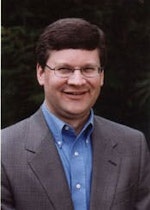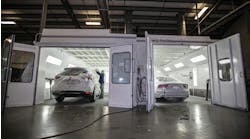What are the issues foremost on the minds of the country’s MSOs? Perhaps no one has their finger on the pulse of the MSO market more so than the moderators and speakers at the third annual MSO Symposium in October in Las Vegas during the International Autobody Congress and Exposition (NACE).
Moderator Vincent Romans of The Romans Group said he worked to pull together speakers and panel discussions for the event that address the key elements of success for MSOs. Developing and maintaining leadership, for example, is a challenge at all levels for MSOs. That’s why he invited two experts from outside the industry to offer insights on topics related to leadership, including a discussion on making good decisions (and avoiding bad ones) by Sydney Finkelstein, a professor and associate dean of executive education at Dartmouth College.
Romans said he believes MSOs are interested in hearing and learning from other MSOs of all sizes. That’s why he scheduled not just a panel discussion among the largest five MSOs, but also one that includes some different sized MSOs (sometimes referred to as “regional MSOs”) to see how they operate and compete, how they view consolidation and how they foresee remaining relevant in a quickly changing industry.
“By hearing from the top MSOs and now from MSOs at different levels, I think we’re bringing a deeper and broader context to the industry, what the risks and opportunities are for those who are in it to stay and for those who are looking to sell,” Romans said.
Another change to this year’s MSO Symposium — opening attendance at the event to a limited number of single-location shop owners — demonstrates another goal of the event, Romans said.
“Those owners get a reality check as to where they fit and who they are when compared with the MSO model,” Romans said. “It may reinforce their model in their own mind, or it may help them with their decision-making as to whether to grow or consider being acquired. In either case, it can help reinforce or change the strategic or financial decisions they make.”
1,000-shop MSO predicted
Growth is what Rex Green of BB&T Capital Markets believes is on the mind of MSOs, and he predicts that within five years at least one consolidator will have more than 1,000 shops.
This year mark Green’s third presentation at the MSO Symposium. BB&T is the investment banking firm that has been involved in several large acquisitions in the industry, including working with True2Form on its 2010 sale to The Boyd Group, working with The Boyd Group on its 2011 acquisition of Cars Collision and working on last year’s acquisition of Service King by The Carlyle Group.
Green said smaller MSOs need to be thinking about whether they wish to continue to operate independently or sell to a consolidator.
“The life of an independent or small MSO will inevitably at some point in the next few years run smack into some industry forces that are overwhelming,” Green said.
He believes that eventually between two and five collision repair businesses will hold a combined 60 percent market share. But how does his future vision differ from the predictions in the early 1990s that the industry would be down to 15,000 shops within a decade? Part of it is the rise in access to capital available now.
“But what’s really different now is the insurance companies and information technology,” Green said. “The rise of Geico and Progressive certainly has changed the whole dynamic in terms of the profitability of an insurance policy. Insurance companies have to cut costs now and improve customer satisfaction. That’s going to drive (business) to the parties who can, by scale and investment, fix a car at the lowest possible cost and still maintain quality, and who have the investments in customer-related activities that will increase customer satisfaction.”
Lessons from abroad
As a long-time organizer of IBIS, the International Bodyshop Industry Symposium (IBIS), David Lingham brings an international perspective to the MSO Symposium. The goal of his panel discussion, Lingham said, was to look at MSO models worldwide to compare them with those in the United States to foster thought and discussion about “what lessons could be learned from others and what could possibly be transferred into the U.S. models.”
In some countries, for example, small groups of independently-owned shops have banded together into loose-knit networks without some of the elements of the more formal franchise model in the United States. They pool some funds for such things as group marketing, for example. There are some obvious pros and cons to such a model, Lingham said, and their success or failure often rests with those chosen to manage the network.
Lingham said the role of the OEMs (in terms of shop networks) and specialization versus generalization also vary by country, and could be an opportunity or a threat – depending on your perspective – here in the United States as well.
Lingham believes four key subjects currently dominate the thoughts of MSO executives. First, he said, they are concerned about “successful absorption” when a larger MSO acquires a smaller MSO.
“There is no doubt this gobbling up of one MSO by another MSO will continue,” Lingham said. Integrating the larger company’s culture into another’s in a different market or state can be a challenge.
Similarly, he said, MSO executives are concerned about “consistency of performance.” In addition to scale, that consistency in performance and customer experience is a key selling point for MSOs, so it is critical to their success that it happen.
Thirdly, MSOs are not surprisingly concerned about “developing great relationships with insurers or anybody who can provide them work to keep their shops fed,” Lingham said.
Lastly, he believes, MSOs are concerned about how to attract the talent they need.
“The collision repair industry desperately needs to raise its image to attract the right people at all levels,” Lingham said. “I think the industry as a whole needs to come together on this.”




